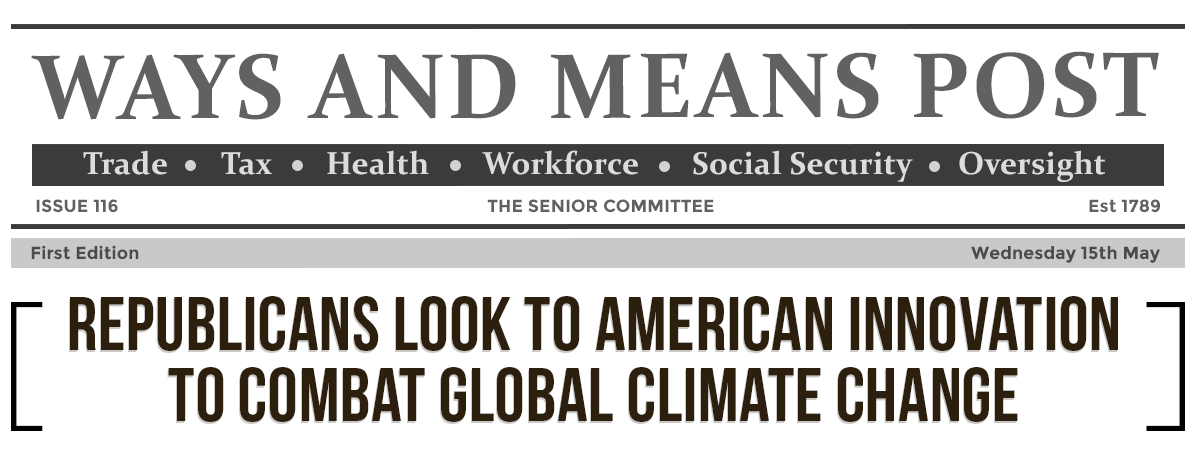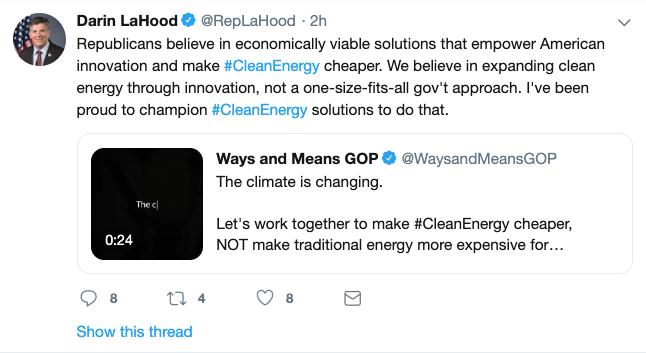Republicans Look to American Innovation to Combat Global Climate Change
“The world needs a leader in discovering new clean energy technology – and whatever country wins that race will greatly benefit because of it, as will people around the world,” said Rep. Kevin Brady (R-TX), the top Republican on the House Ways and Means Committee, at a hearing focused on the economic effects of climate change.
“That innovation leader needs to be the United States,” emphasized Rep. Brady.
The House Ways and Means Committee held a hearing entitled “The Economic and Health Consequences of Climate Change.” Committee Republicans emphasized throughout the hearing that the time to act on reducing global greenhouse gas emissions is now.
While Democrats on the Committee simply reiterated the fact that there is a problem without offering solutions, conservatives stressed the need for immediate action.
Republican lawmakers said America must speed up innovation for cleaner and cheaper energy technologies, incentivize clean energy utilization without raising taxes on working families, and support the Environmental Goods Agreement negotiations at the World Trade Organization and other trade negotiations to remove tariff and nontariff barriers on U.S. exports of green manufactured goods and technologies.
Richard J. Powell, Executive Director of ClearPath, Inc., a nonprofit focused on accelerating clean energy innovation, agreed. Mr. Powell said “a comprehensive suite of policies starting with public-private research, development and demonstration, combined with financing tools and regulatory reforms, have repeatedly been our national recipe for breakthroughs.”
Getting Clean Energy to Market
The key to combatting climate change, Republicans argued, is to bring new, innovative technologies to market quicker.
Rep. Tom Reed (R-NY), said that “you can mandate an emission relief,” but, as the New Yorker noted, “if you don’t have the technology out there, isn’t that just a paper tiger?”
Mr. Powell agreed. He explained that “over the past decade, if you look at the share of energy that is coming from clean or zero emission resources – that hasn’t increased . . . despite everything we’ve attempted to do.”
“With existing technology we’re just keeping pace,” said Powell. “We’re not accelerating the transition.”
Rep. Reed said this must change. He said “unleashing the power of the market across the world . . . should be the top priority” to improving the climate.
Rep. Darin LaHood (R-IL) also advocated for continuing to promote policies that expand access to clean energy – citing legislation he has offered during this Congress.
Taxes and mandates: Well intentioned, but unfeasible and regressive.
A longstanding proposal to combat climate change is a tax on carbon emissions, or a “carbon tax.” Proponents of such a tax have argued for a variety of approaches on implementation, with some floating a “revenue-neutral” approach, either by having dividends be paid out to taxpayers or through other means.
Ballot measures for a carbon tax at the state level have been widely rejected by voters.
Republicans said that low-income families would be the most hurt by a new tax. Rep. Kenny Marchant (R-TX) stressed that not only does implementing a new tax immediately hurt working-class families by forcing them to pay more in their monthly utility bills and at the gas station, but that returning potential dividends to families would be a logistical nightmare.
Citing results of what happened when Alaska implemented a similar dividends-based approach, Rep. David Schweikert (R-AZ) explained that the state actually created a “disincentive” for reducing carbon emissions. The Arizonan said that with the guarantee of the government giving you dollars, many businesses took advantage of the system and ended up actually using more carbon.
Recognizing that this is an issue that all countries must tackle together, Rep. Ron Estes (R-KS) explained in an op-ed for The Hill that current international accords don’t safeguard other countries from continuing to pollute the atmosphere.
“The poorly conceived Paris climate agreement would have done almost nothing to improve the environment, while destroying hundreds of thousands of American jobs and reducing our gross domestic product by about $2.5 trillion over the next 15 years,” wrote Rep. Estes. “It would, however, have allowed China and India to continue to destroy the environment with no consequence.”
Progress is happening. Republicans want to do more.
Despite narratives that the U.S. hasn’t made progress on reducing its carbon footprint, Republicans stressed that the evidence proves otherwise – all without federal mandates or tax hikes on working families.
Rep. Schweikert, went through a number of examples of how the private sector is innovating in ways to reduce carbon emissions and increase clean energy production.
“We need to understand this technology and promote it,” said Rep. Schweikert.
“The U.S. is leading the world is decreasing greenhouse gases – you can’t deny that,” said Rep. Brady. “Renewable energy is up and continues to grow . . . CO2 emissions have fallen to their lowest level in a generation . . . and emissions of the six most common pollutants that are tracked by the EPA have fallen 73 percent over the past three decades – you can’t deny that.”
“We are making progress,” said Rep. Brady. “Is it enough? Absolutely not. But we can learn from what has brought us that progress to solve the challenges ahead of us.”


